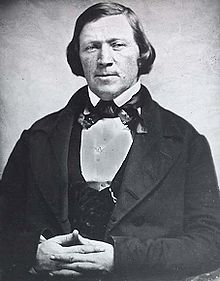
Historians debate the role of Brigham Young in the Mountain Meadow Massacre.
When the massacre took place, Young was theocratic leader of the Utah Territory.
It is widely agreed that "nothing" happened in Utah without Young's approval.
Dear A,
Thanks for your call.
Here's the PBS Frontline program I mentioned. http://www.pbs.org/mormons/
"The Mormons" is a singular accomplishment. (To stream this two-part documentary, click "Full Program Online" - a link located on the right margin of the homepage. Or, go directly to http://www.pbs.org/mormons/
"The Mormons" is a singular accomplishment. (To stream this two-part documentary, click "Full Program Online" - a link located on the right margin of the homepage. Or, go directly to http://www.pbs.org/mormons/
Your interest in history - coupled with your involvement in politics - will, I think, keep you glued.
The first two hours -- dedicated to the foundation and early history of Mormonism -- are eye-poppingly dramatic.
A related item...
Harold Bloom -- the Yale professor and McArthur "genius" perhaps best known for "The Western Canon," http://www.amazon.com/
The opinions expressed by Bloom are favorably disposed to Joseph Smith's original vision.
Recently, however, Bloom published a lacerating attack on Mitt Romney in The New York Times - http://www.nytimes.
Excerpt: "What I call the American Religion, and by that I mean nearly all religions in this country, socially manifests itself as the Emancipation of Selfishness. Our Great Emancipator of Selfishness, President Ronald Reagan, refreshingly evaded the rhetoric of religion, but has been appropriated anyway as the archangel of American spiritualized greed... Obsessed by a freedom we identify with money, we tolerate plutocracy as if it could someday be our own ecstatic solitude. A first principle of the American Religion is that each of us rarely feels free unless he or she is entirely alone, particularly when in the company of the American Jesus. Walking and talking with him is akin to receiving his love in a personal and individual relationship. A dark truth of American politics in what is still the era of Reagan and the Bushes is that so many do not vote their own economic interests. Rather than living in reality they yield to what oddly are termed “cultural” considerations: moral and spiritual, or so their leaders urge them to believe."
I hope you have time to check out "The Mormons."
Once engaged, I think you'll undertake "the marriage" - even if it means polygamy.
Pax on both houses
Alan
PS In the following opinion piece, Mormon political commentator, Joanna Brooks, takes Bloom to task - http://www.
PPS To my astonishment, I came away from "The Mormons" with a more sympathetic view of polygamy.
"The terrible thing about our time is precisely the ease with which theories can be put into practice. The more perfect, the more idealistic the theories, the more dreadful is their realization. We are at last beginning to rediscover what perhaps men knew better in very ancient times, in primitive times before utopias were thought of: that liberty is bound up with imperfection, and that limitations, imperfections, errors are not only unavoidable but also salutary. The best is not the ideal. Where what is theoretically best is imposed on everyone as the norm, then there is no longer any room even to be good. The best, imposed as a norm, becomes evil.”
”Conjectures of a Guilty Bystander” by Thomas Merton http://alanarchibald.homestead.com/ThomasMerton.html /// http://en.wikipedia.org/wiki/Thomas_Merton
PPS To my astonishment, I came away from "The Mormons" with a more sympathetic view of polygamy.
The Mountain Meadows Massacre
"Men never do evil so completely and cheerfully as when they do it from a religious conviction."
Blaise Pascal
No comments:
Post a Comment